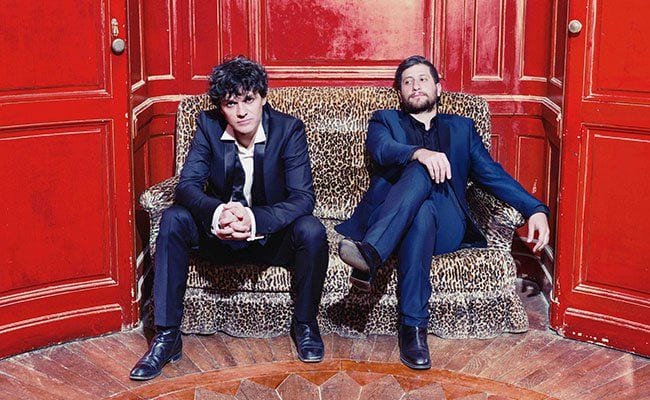
Even when recording in the studio, French duo Aufgang seem to imagine themselves on stage. The drumroll that opens their latest album, Turbulences, establishes from the beginning that this is a theatrical work, and the sense that there is a lavish grand drape framing the whole performance never abates throughout the record. Aufgang employ everything from regal chamber pop to dank industrial here, yet regardless the elegant but stuffy feel of an ornate music hall would befit the album more than a small, intimate club or lounge. Indeed, Turbulences invests its entire being in spectacle, but in their pursuit of this end, Aufgang have sacrificed almost any trace of intimacy or human connection.
The band seems to take pride in eluding listeners and subverting what they perceive as our expectations. Merging baroque instrumentation with contemporary synths and electronics is nothing new—Björk showed the world how it’s done all the way back in 1997 with Homogenic—but Aufgang conduct themselves here as though they have made a major discovery, despite in fact being rather clumsy in their attempts to combine disparate styles. Rather than weaving their sounds into one another and finding ways to put bouncy synths in dialogue with sweeping strings, Aufgang often simply paste the two on top of one another as if with super glue, expecting that their supposed cosmopolitanism will speak for itself and that it will be enough to make their album interesting. Unfortunately, despite being very weird at times, Turbulences is not particularly interesting at all.
The record opens with the particularly atrocious “Mizmar”, which attempts to add to the cosmopolitan flair by paying homage to Middle Eastern music. Pianist Rami Khalifé himself hails from Beirut, and I myself can claim no expertise in music from that region. However, the band injects the track with such over-the-top melodrama that it ends up sounding inescapably more like the Anglicized soundtracks of Aladdin and The Secret Garden than anything else.
Immediately afterwards, they takes a sharp turn to industrial with the grimy “Backstabbers” and “Fix”. The latter is one of the album’s relative highlights, with an insistent, distorted vocal arguing persistently in favor of some kind of self-denial and asceticism: “Wanna love, gotta hate / Wanna rest, gotta move / Wanna buy, gotta sell”, it proclaims. The song at least feels like something one could enjoy hearing through the speakers of a dingy subterranean club while waiting for a show to begin, and it almost does service towards moving the album away from its ornate austerity. But then, Aufgang cannot resist forcing the song to take flight, gradually building it up until it becomes unnaturally huge and ungainly. The duo would have done well to allow the song to lurk in its depths, rather than pushing it to ascend to unwanted heights and thus belying its natural strengths.
The band has more success with the instrumental “Paysage”, which serves as a bridge between the two halves of the album. Khalifé meditates on a rhythmic house piano motif while burbling electronics pulsate in the background but do not intrude. It is a welcome show of relative delicacy and restraint on an album where both are often lacking. The track then bleeds into the hyper-perky “Shaman”, a catchy pop song that becomes nearly unlistenable in its frenetic excess.
“Turbulence” begins by again giving the listener a much-needed moment to breathe, starting off with delicate piano before ominous keys and ghostly German utterances forebode what’s to come. What follows is a deluge of cacophonous noise and distorted wails that undoes all of the song’s tragic fragility. While perhaps attempting to capture a Kate Bush-esque balance between delicacy and fright, it is instead the musical equivalent of a jump scare, of tasteless blood and gore existing only for shock value.
The pretty, luxurious, but forgettable ballad “Lost” is sandwiched in between “Turbulence” and the album’s spiritual closer “Summer” (excluding the Grand Yellow remix of “Shaman”, which acts as a kind of epilogue). “Summer” is easily the highlight of the record, with a breezy easiness and a welcome female vocal feature that at last gives the album a much-needed sense of openness. “I can’t wait till the summer” is such an unassuming, simple line, and it is nice to hear Aufgang no longer trying to impress or surprise.
While the song is as good of an ending as Aufgang could hope for, “Summer” nonetheless makes little psychological sense when tacked onto the songs that precede it. After Aufgang have spent almost an entire collection of songs alienating the listener with their unrestrained indulgences and overblown theatricality, one song that actually shows a hint of warmth and invites you to come closer is not enough to save an often insufferable album. For all its technical acuity and lavish spectacle, Turbulences is decidedly lacking in emotional nuance and substance. It spends so much time and energy in sounding grand and impressive that it often forgets to be human. As a result, the album is all but entirely emotionally unavailable.


![Call for Papers: All Things Reconsidered [MUSIC] May-August 2024](https://www.popmatters.com/wp-content/uploads/2024/04/all-things-reconsidered-call-music-may-2024-720x380.jpg)



